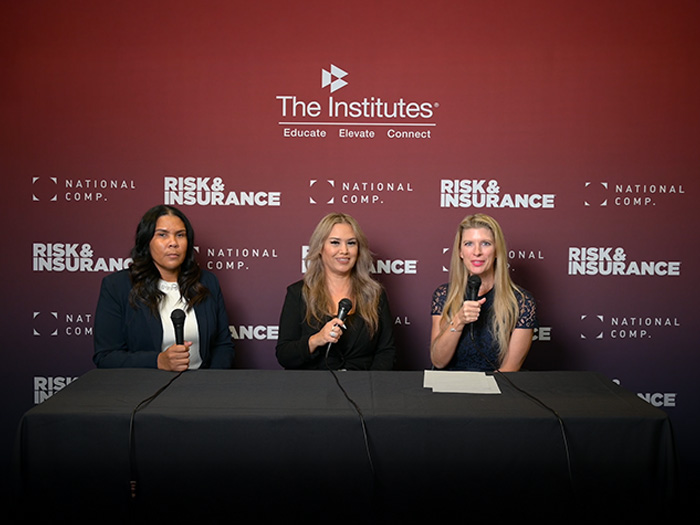Building the Next Generation of Insurance Experts: How the PRC Designation Is Bridging the Industry’s Talent Gap

That word, insurance, encapsulates many things. From business interruption to risk management, general liability, workers’ compensation, commercial auto and more, insurance means a lot of things to a lot of people.
It also means knowing and understanding the components that go into commercial property & casualty, an ever-evolving field of insurance that is posed to have a nearly 400,000 shortage in talent by 2026.
Luckily, the industry of insurance is working hard to garner interest and nurture its talent into the field. Universities are specializing degrees in insurance and risk management. Recruiters are taking the time to understand what up-and-coming graduates value in their livelihoods. People seeking a second-act career are finding a logical segue into insurance.
But for these folks finding insurance brokering as a career for the first time, the question becomes less about what to do and instead on how to gather the knowledge necessary to do the job effectively.
There’s a Designation for That
The Professional Risk Consultant designation (PRC) was born from an understanding that the insurance industry is changing.
More talent is needed to fill the gaps left by the silver tsunami exiting the profession. But that places newer entrants in a position where they are being asked to know and give advice on policies they are still working to understand themselves.
“We recognized that there was a big need for quality education to better equip the next generation of insurance brokers to be successful,” said Hunter Fausnacht, president – Agent & Broker Group, The Institutes.
“We did an analysis and study of consumer behavior, and saw that there really wasn’t a bona fide starting place where somebody could get a confident foundation of how brokerage works and the coverages that you need to know and how it ties into the overall ecosystem of risk and insurance,” he shared.
The industry itself has become more consultative in nature. More insureds are looking for advice pre-incident, bolstering their risk management and prevention strategies long before something can impact their business.
Because of this, having a knowledgeable broker in their back pocket is more than a good idea; it’s become a necessity.
“To be a consultant, where you’re really adding customer value, you need to have some experience,” said Fausnacht. The PRC aims to give learners the baseline understanding of P&C so that they can provide clear and effective consultative services to customers.
It acts as the foundation level of understanding how a broker provides consultative services to the customer, while providing the technical foundation to boost confidence and understanding of common risk coverages.
“It’s a knowledge that’s a few inches deep and a mile wide to help start your career,” Fausnacht said. “You learn how insurance works and what you need to know about P&C. This designation teaches the technical knowledge to help newer brokers confidently start to interact with customers.”
Why the PRC?
Consultative insurance roles are being sought out by the consumer across the board, and brokers are in a prime position to fulfill the need. The PRC is more than a designation providing the baseline insurance knowledge that clients are interested in; it’s also places the stepping stones for brokers to expand their career.
“Brokerage is an entrepreneurial job. You do receive guidance from your company, but really, you make your career, and you have to buy into that early,” Fausnacht said.
It’s more than today’s responsibilities; the PRC enables learners to think about what they want to be doing in the long-term.
“You have to start designing your plan for what kind of professional you want to become in the future. Knowledge is a key piece of insurance brokerage. It’s not something that can be faked,” he said.
For Scott Buczek, PRC, AINS, AIS, ARM, ACRM, associate client manager, The Baldwin Group, earning his PRC felt like the right step toward solidifying his insurance knowledge: “I wanted to reinforce my knowledge with current aspects of the license I currently have and help towards providing my CE credits required,” he shared.
Similarly, Paula McLoud, PRC, CRIS, AAI, senior evidence specialist, commercial risk, The Baldwin Group, wanted to strengthen her insurance knowledge and “deepen my understanding of essential coverages.” Through the PRC, she’s been able to step up to the challenge in her career.
“This accreditation has provided me with new opportunities,” she said. “I felt more empowered to explain coverages to my colleagues and was selected as a subject matter expert to share insights, experiences and best practices on certificates of insurance at regional Azimuth training sessions for new hires.”
“I embarked on the journey of earning my PRC designation with the encouragement and support of my boss and colleagues,” added Jacob Clonts, CPCU, ARM, PRC, senior client service specialist, commercial risk, The Baldwin Group. “They motivated me to take the initial course, which set the foundation for my designation process.”
The designation earning process is designed to fit its learners, meaning those working toward the PRC have the ability to set the pace. Flexibility in learning is a huge boon, especially for those who are required to have continuing education credits as part of their profession.
“The PRC took me a couple of months as there were two different courses, PRC 101 and 102, [to complete]. Also, it helped that it was self-paced as I was given the ability to do a few hours of education a week through the Baldwin Group development program,” Buczek said.
Both Buczek and Clonts noted support from their employers as a big motivation to earn this designation. Employers that prioritize continued learning also show employees their dedication to their staff, which can further drive higher retention rates and help close the talent gap.
Continued Education with Complementary Designations
Perhaps the best part of earning one designation is in the desire to keep learning. Designations cover a broad range of topics, often boosting earners’ careers and giving them credibility among clients and employers alike.
The PRC is no different, and according to its designees, it’s a great baseline for expanding insurance knowledge. For example, after earning his PRC, Clonts made the decision to pursue his CPCU.
“The PRC designation took me a few months to complete, while the CPCU took about a year. Overall, I now hold three designations, including ARM and CPCU, which have significantly enhanced my credibility and allowed my input to be valued more highly, even though I remain in my role as a client service specialist,” he shared.
“I currently have the AIS, AINS, ARM, and ACRM,” Buczek said. “I am currently slowly working on my AIDA. All my CEs have been through the earning of designations.”
The ARM, or Associate in Risk Management, is a logical choice for brokers upon receiving their PRC, because after key understanding surrounding P&C is learned, brokers will want to equip themselves with risk management know how.
“Risk management is baked into everything we do. It’s the future,” Fausnacht said.
Businesses want to protect their assets, and the ARM aims to build a framework on how to think about risk. From there, the CPCU is often considered the third step to insurance brokerage mastery. And the best part is that the pathway from an ARM to a CPCU is just five additional courses.
“The PRC designation provided a strong starting point for me. Soon after earning this certification, I felt ready to further expand my knowledge. I obtained the CRIS designation, which has been beneficial in my role in the certificate department, focusing mainly on construction accounts within commercial risk.,” McLoud added.
Additionally, a new designation coming from The Institutes is an extension of the PRC: The Professional Employee Benefits Risk Consultant designation.
It was clear to Fausnacht and his team that in addition to the baseline knowledge and understanding of P&C insurance the PRC brought, there was an industry need to give that same inch deep, mile wide education to brokers in the employee benefits space.
“We saw that, on average, a broker’s revenue would be anywhere from high 20%to even up to 40% in employee benefits,” Fausnacht said. “We sought to build this and followed the Professional Risk Consultant model.”
This sister designation launched in October 2025.
While pursuing additional education beyond the “typical” classroom can feel daunting, Fausnacht added a final piece of advice: “There’s really not a perfect time to start, so starting today is about as good as you’ll get … I used to broker for Willis [now WTW], and didn’t have the technical knowledge that I needed.
“I built relationships and was pretty effective at selling, but it did not take long until I could see the customer knew I didn’t have the knowledge to be a successful consultant,” he shared. “So professionals, get your knowledge early. It’s going to help you be successful. It’s going to pay dividends throughout your career.” &








